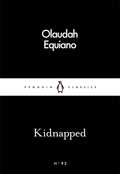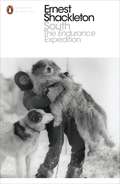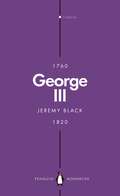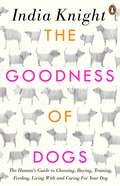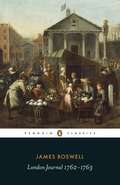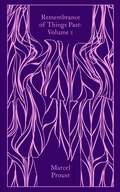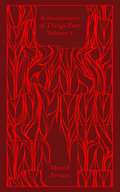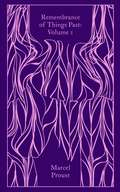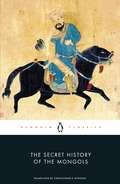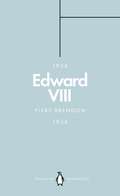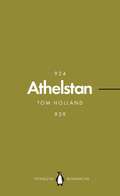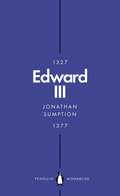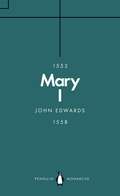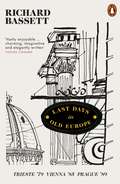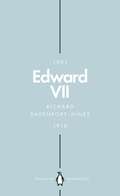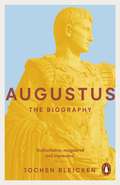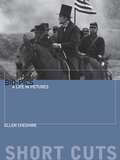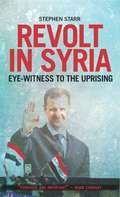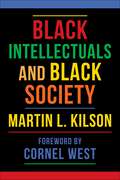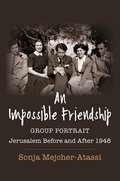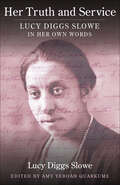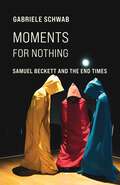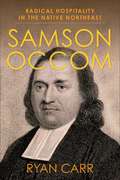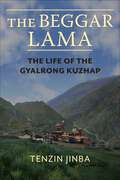- Table View
- List View
Kidnapped (Penguin Little Black Classics)
by Olaudah Equiano'Cut iron with iron,What makes iron valuable,Big kuku tree and big silk-cotton tree,Fari and Kaunju -' Told and retold since the fourteenth century, this West African epic chronicles the story of the mighty warrior who saves his people and founds an empire. One of 46 new books in the bestselling Little Black Classics series, to celebrate the first ever Penguin Classic in 1946. Each book gives readers a taste of the Classics' huge range and diversity, with works from around the world and across the centuries - including fables, decadence, heartbreak, tall tales, satire, ghosts, battles and elephants.
South: The Endurance Expedition (Penguin Modern Classics)
by Ernest ShackletonThe Imperial Trans-Antarctic Expedition was perhaps the most ambitious, elaborate and confident of all the British attempts to master the South Pole. Like the others it ended in disaster, with the Endeavour first trapped and then crushed to pieces in the ice and its crew trapped in the Antarctic, seemingly doomed to a slow and horrible death. In the face of extraordinary odds, Shackleton, the expedition's leader, decided on the only course that might just save them: a 700 nautical mile voyage in a small boat across the ferocious Southern Ocean in the forelorn hope of reaching the only human habitation within range: a small whaling station on the rugged, ice-sheeted island of South Georgia.South tells the story both of the whole astonishing expedition and of Shackleton's journey to rescue his men - one of the greatest feats of navigation ever recorded.
George III: Madness and Majesty (Penguin Monarchs)
by Jeremy BlackKing of Britain for sixty years and the last king of what would become the United States, George III inspired both hatred and loyalty and is now best known for two reasons: as a villainous tyrant for America's Founding Fathers, and for his madness, both of which have been portrayed on stage and screen.In this concise and penetrating biography, Jeremy Black turns away from the image-making and back to the archives, and instead locates George's life within his age: as a king who faced the loss of key colonies, rebellion in Ireland, insurrection in London, constitutional crisis in Britain and an existential threat from Revolutionary France as part of modern Britain's longest period of war.Black shows how George III rose to these challenges with fortitude and helped settle parliamentary monarchy as an effective governmental system, eventually becoming the most popular monarch for well over a century. He also shows us a talented and curious individual, committed to music, art, architecture and science, who took the duties of monarchy seriously, from reviewing death penalties to trying to control his often wayward children even as his own mental health failed, and became Britain's longest reigning king.
The Goodness of Dogs: The Human's Guide to Choosing, Buying, Training, Feeding, Living With and Caring For Your Dog
by India KnightThis book is a celebration of happy dogs and the happy people who own them. At once a companion, a manual and a repository of useful information, The Goodness of Dogs also contains avid dog-lover India Knight's reflections on the sheer brilliance of dogs and the life-enhancing delight of dog ownership. If you have reached dog nirvana, you will recognize yourself. If you haven't yet - this book will help you. With chapters ranging from how to choose a breed (and where to get it from), to the joy and chaos of puppies, to feeding and training your dog, to choosing a vet and even how to cope with illnesses and death, The Goodness of Dogs will take you through every facet of dog ownership.Full of India Knight's inimitable wit and the sound advice she is famous for, and beautifully illustrated by artist Sally Muir, this book will make the perfect gift for any dog-lover.
London Journal 1762-1763 (Penguin Classics)
by James BoswellEdinburgh-born James Boswell, at twenty-two, kept a daily diary of his eventful second stay in London from 1762 to 1763. This journal, not discovered for more than 150 years, is a deft, frank and artful record of adventures ranging from his vividly recounted love affair with a Covent Garden actress to his first amusingly bruising meeting with Samuel Johnson, to whom Boswell would later become both friend and biographer. The London Journal 1762-63 is a witty, incisive and compellingly candid testament to Boswell's prolific talents.
London Journal 1762-1763 (The\yale Editions Of The Private Papers Of James Boswell Ser.)
by James BoswellEdinburgh-born James Boswell, at twenty-two, kept a daily diary of his eventful second stay in London from 1762 to 1763. This journal, not discovered for more than 150 years, is a deft, frank and artful record of adventures ranging from his vividly recounted love affair with a Covent Garden actress to his first amusingly bruising meeting with Samuel Johnson, to whom Boswell would later become both friend and biographer. The London Journal 1762-63 is a witty, incisive and compellingly candid testament to Boswell's prolific talents.
Remembrance of Things Past: Volume 3
by Marcel ProustOne of the greatest translations of all time: Scott Moncrieff's classic version of Proust, published in three stunning clothbound volumes designed by Coralie Bickford-Smith.Proust's masterpiece is one of the seminal works of the twentieth century, recording its narrator's experiences as he grows up, falls in love and lives through the First World War. A profound reflection on art, time, memory, self and loss, it is often viewed as the definitive modern novel. C. K. Scott Moncrieff's famous translation from the 1920s is today regarded as a classic in its own right and is now available in three volumes in Penguin Classics.This first volume includes Swann's Way and Within a Budding Grove.'Scott Moncrieff's [volumes] belong to that special category of translations which are themselves literary masterpieces ... his book is one of those translations, such as the Authorized Version of the Bible itself, which can never be displaced' - A. N. Wilson 'For the reader wishing to tackle Proust your guide must be C K Scott Moncrieff ... There are some who believe his headily perfumed translation of À la recherche du temps perdu conjures Belle Époque France more vividly even than the original' - Telegraph 'I was more interested and fascinated by your rendering than by Proust's creation' - Joseph Conrad to Scott Moncrieff
Remembrance of Things Past: Volume 2
by Marcel ProustOne of the greatest translations of all time: Scott Moncrieff's classic version of Proust, published in three stunning clothbound volumes designed by Coralie Bickford-Smith.Proust's masterpiece is one of the seminal works of the twentieth century, recording its narrator's experiences as he grows up, falls in love and lives through the First World War. A profound reflection on art, time, memory, self and loss, it is often viewed as the definitive modern novel. C. K. Scott Moncrieff's famous translation from the 1920s is today regarded as a classic in its own right and is now available in three volumes in Penguin Classics.This first volume includes Swann's Way and Within a Budding Grove.'Scott Moncrieff's [volumes] belong to that special category of translations which are themselves literary masterpieces ... his book is one of those translations, such as the Authorized Version of the Bible itself, which can never be displaced' - A. N. Wilson 'For the reader wishing to tackle Proust your guide must be C K Scott Moncrieff ... There are some who believe his headily perfumed translation of À la recherche du temps perdu conjures Belle Époque France more vividly even than the original' - Telegraph 'I was more interested and fascinated by your rendering than by Proust's creation' - Joseph Conrad to Scott Moncrieff
Remembrance of Things Past: Volume 1
by Marcel ProustOne of the greatest translations of all time: Scott Moncrieff's classic version of Proust, published in three stunning clothbound volumes designed by Coralie Bickford-Smith.Proust's masterpiece is one of the seminal works of the twentieth century, recording its narrator's experiences as he grows up, falls in love and lives through the First World War. A profound reflection on art, time, memory, self and loss, it is often viewed as the definitive modern novel. C. K. Scott Moncrieff's famous translation from the 1920s is today regarded as a classic in its own right and is now available in three volumes in Penguin Classics.This first volume includes Swann's Way and Within a Budding Grove.'Scott Moncrieff's [volumes] belong to that special category of translations which are themselves literary masterpieces ... his book is one of those translations, such as the Authorized Version of the Bible itself, which can never be displaced' - A. N. Wilson 'For the reader wishing to tackle Proust your guide must be C K Scott Moncrieff ... There are some who believe his headily perfumed translation of À la recherche du temps perdu conjures Belle Époque France more vividly even than the original' - Telegraph 'I was more interested and fascinated by your rendering than by Proust's creation' - Joseph Conrad to Scott Moncrieff
The Secret History of the Mongols
by Christopher P. AtwoodA new translation of a great historical epic, recounting the turbulent life and times of Chinggis Khan'Bear the sword andHew asunder high and haughty necksSlash apart all strong and self-willed shoulders'Born poor into a world of dangers and hardships, Chinggis (or Genghis) Khan would grow up to unify Mongolia and conquer a vast empire stretching from modern-day Beijing to Baghdad. The Secret History of the Mongols, written after Chinggis's death in the thirteenth century, is a great historical saga recounting not only his turbulent life and times, but that of his loved ones, ancestors and heirs. This remarkable new translation of the earliest surviving work written in Mongolian gives insight into a world of warlords, kinship, horses, yurts, shamans and vast landscapes, where bloody battles and violent family conflicts are impelled by Heaven's destiny.Translated with an introduction by Christopher P. Atwood
Edward VIII: The Uncrowned King (Penguin Monarchs)
by Piers Brendon'After my death,' George V said of his eldest son and heir, 'the boy will ruin himself within twelve months.'The forecast proved uncannily accurate. Edward VIII came to the throne in January 1936, provoked a constitutional crisis by his determination to marry the American divorcée Wallis Simpson, and abdicated in December. He was never crowned king.In choosing the woman he loved over his royal birthright, Edward shook the monarchy to its foundations. Given the new title 'Duke of Windsor' and essentially sent into exile, he remained a visible skeleton in the royal cupboard until his death in 1972 and he haunts the house of Windsor to this day.Drawing on unpublished material, notably correspondence with his most loyal (though much tried) supporter Winston Churchill, Piers Brendon's superb biography traces Edward's tumultuous public and private life from bright young prince to troubled sovereign, from wartime colonial governor to sad but glittering expatriate. With pace and panache, it cuts through the myths that still surround this most controversial of modern British monarchs.
Athelstan: The Making of England (Penguin Monarchs)
by Tom HollandThe formation of England occurred against the odds: an island divided into rival kingdoms, under savage assault from Viking hordes. But, after King Alfred ensured the survival of Wessex and his son Edward expanded it, his grandson Athelstan inherited the rule of both Mercia and Wessex, conquered Northumbria and was hailed as Rex totius Britanniae: 'King of the whole of Britain'.Tom Holland recounts this extraordinary story with relish and drama, transporting us back to a time of omens, raven harbingers and blood-red battlefields. As well as giving form to the figure of Athelstan - devout, shrewd, all too aware of the precarious nature of his power, especially in the north - he introduces the great figures of the age, including Alfred and his daughter Aethelflaed, 'Lady of the Mercians', who brought Athelstan up at the Mercian court. Making sense of the family rivalries and fractious conflicts of the Anglo-Saxon rulers, Holland shows us how a royal dynasty rescued their kingdom from near-oblivion and fashioned a nation that endures to this day.
Edward III: A Heroic Failure (Penguin Monarchs)
by Jonathan SumptionEdward III lived through bloody and turbulent times. His father was deposed by his mother and her lover when he was still a teenager; a third of England's population was killed by the Black Death midway through his reign; and the intractable Hundred Years War with France began under his leadership. Yet Edward managed to rule England for fifty years, and was viewed as a paragon of kingship in the eyes of both his contemporaries and later generations. Venerated as the victor of Sluys and Crécy and the founder of the Order of the Garter, he was regarded with awe even by his enemies. But he lived too long, and was ultimately condemned to see thirty years of conquests reversed in less than five. In this gripping new account of Edward III's rise and fall, Jonathan Sumption introduces us to a fêted king who ended his life a heroic failure.
Mary I: The Daughter of Time (Penguin Monarchs)
by John EdwardsThe elder daughter of Henry VIII, Mary I (1553-58) became England's ruler on the unexpected death of her brother Edward VI. Her short reign is one of the great potential turning points in the country's history. As a convinced Catholic and the wife of Philip II, king of Spain and the most powerful of all European monarchs, Mary could have completely changed her country's orbit, making it a province of the Habsburg Empire and obedient again to Rome. These extraordinary possibilities are fully dramatized in John Edward's superb short biography. The real Mary I has almost disappeared under the great mass of Protestant propaganda that buried her reputation during her younger sister, Elizabeth I's reign. But what if she had succeeded?
Last Days in Old Europe: Trieste '79, Vienna '85, Prague '89
by Richard BassettSelected as a Book of the Year in the TLS and SpectatorThe final decade of the Cold War, through the eyes of a laconic and elegant observerIn 1979 Richard Bassett set out on a series of adventures and encounters in central Europe which allowed him to savour the last embers of the cosmopolitan old Hapsburg lands and gave him a ringside seat at the fall of another ancien regime, that of communist rule. From Trieste to Prague and Vienna to Warsaw, fading aristocrats, charming gangsters, fractious diplomats and glamorous informants provided him with an unexpected counterpoint to the austerities of life along the Iron Curtain, first as a professional musician and then as a foreign correspondent.The book shows us familiar events and places from unusual vantage points: dilapidated mansions and boarding-houses, train carriages and cafes, where the game of espionage between east and west is often set. There are unexpected encounters with Shirley Temple, Fitzroy Maclean, Lech Walesa and the last Empress of Austria. Bassett finds himself at the funeral of King Nicola of Montenegro in Cetinje, plays bridge with the last man alive to have been decorated by the Austrian Emperor Franz-Josef and watches the KGB representative in Prague bestowing the last rites on the Soviet empire in Europe.Music and painting, architecture and landscape, food and wine, friendship and history run through the book. The author is lucky, observant and leans romantically towards the values of an older age. He brilliantly conjures the time, the people he meets, and Mitteleuropa in one of the pivotal decades of its history.
Edward VII: The Cosmopolitan King (Penguin Monarchs)
by Richard Davenport-HinesLike his mother Queen Victoria, Edward VII defined an era. Both reflected the personalties of their central figures: hers grand, imperial and pretty stiff; his no less grand, but much more relaxed and enjoyable. This book conveys Edward's distinct personality and significant influences. To the despair of his parents, he rebelled as a young man, conducting many affairs and living a life of pleasure. But as king he made a distinct contribution to European diplomacy and - which is little known - to London, laying out the Mall and Admiralty Arch. Richard Davenport-Hines's book is as enjoyable as its subject and the age he made.
Augustus: The Biography
by Jochen BleickenThe great modern biography of Augustus, founder of the Roman EmpireBorn to a plebeian family in 63 BC, Octavian was a young solder training abroad when he heard news of Julius Caesar's brutal assassination - and discovered that he was the dictator's sole political heir. With the opportunism and instinct for propaganda that were to characterize his rule, Octavian rallied huge financial, military and political backing to eliminate his opponents, end the bloody turmoil that had so long wracked Rome and, finally, take autocratic control of a state devoted to republicanism. He became Augustus - Rome's first Emperor, and the founder of the greatest empire the world had ever seen.In this monumental biography, translated into English for the first time by Anthea Bell, Jochen Bleicken tells the story of a man who found himself a demi-god in his own lifetime and paints a portrait of one of the most dramatic periods of Roman history.
Bio-pics: A Life in Pictures (Short Cuts)
by Ellen CheshireBio-pics: A Life in Pictures offers a series of case studies which throw light on this most unique of genres. Is the bio-pic a genre in its own right? Or are such films merely footnotes in other more traditional genres such as the western or costume drama, depending on the historical figure under scrutiny. Unlike other genre forms bio-pics seemingly share no familiar iconography, codes or conventions. They can be set anywhere and at any time. What links them is quite simply that the films depict the life of an 'important' person. Through a carefully selected range of thematically linked (English-language) bio-pics released since 1990 this book explores key issues surrounding their resurgence, narrative structure, production, subject representation or misrepresentation, and critical response. The films under discussion are grouped around a profession (writers, singers, politicians, sportsmen, criminals, artists) allowing for comparisons to be drawn in approaches to similar subject matter.
Revolt in Syria: Eye-witness to the Uprising
by Stephen StarrIn Revolt, Stephen Starr delves deep into the lives of those affected by the Syrian state over the past five decades. Interviewing people from all levels of society, Starr gathers and interprets the views and beliefs that illustrate why Syria, with its numerous sects and religious diversity, has been so prone to violence and civil instability.
Black Intellectuals and Black Society
by Martin L. KilsonThis book presents the trailblazing political scientist Martin L. Kilson’s essays on leading Black intellectuals of the twentieth century. Kilson examines the ideas and careers of several key thinkers, placing their intellectual odysseys in the context of the dynamics that shaped the Black intelligentsia more broadly. He argues that the trajectory of twentieth-century Black intellectuals was determined by the interplay between formal ideas and Black egalitarian struggle.Beginning with the tension between W. E. B. Du Bois’s civil rights activism and Booker T. Washington’s accommodationism, Kilson explores the formation and evolution of Black intellectuals and activists across generations. Chapters consider Horace Mann Bond’s career in higher education, political scientist John Aubrey Davis’s transition from civil rights activist to federal policy technocrat, Ralph Bunche’s writings on European colonial rule in Africa, Harold Cruse’s classic polemic The Crisis of the Negro Intellectual, E. Franklin Frazier’s analysis of the Black bourgeoisie, Adelaide M. Cromwell’s studies of the challenges facing elite Black women, and Ishmael Reed and Cornel West’s advocacy as public intellectuals amid a conservative turn. Offering timely and engaging insights into the lives and work of pivotal Black intellectuals and activists, this book sheds new light on the abiding questions and debates in Black political thought.
An Impossible Friendship: Group Portrait, Jerusalem Before and After 1948 (Religion, Culture, and Public Life #47)
by Sonja Mejcher-AtassiIn Jerusalem, as World War II was coming to an end, an extraordinary circle of friends began to meet at the bar of the King David Hotel. This group of aspiring artists, writers, and intellectuals—among them Wolfgang Hildesheimer, Jabra Ibrahim Jabra, Sally Kassab, Walid Khalidi, and Rasha Salam, some of whom would go on to become acclaimed authors, scholars, and critics—came together across religious lines in a fleeting moment of possibility within a troubled history. What brought these Muslim, Jewish, and Christian friends together, and what became of them in the aftermath of 1948, the year of the creation of the State of Israel and the Palestinian Nakba?Sonja Mejcher-Atassi tells the story of this unlikely friendship and in so doing offers an intimate cultural and social history of Palestine in the critical postwar period. She vividly reconstructs the vanished social world of these protagonists, tracing the connections between the specificity of individual lives and the larger contexts in which they are embedded. In exploring this ecumenical friendship and its artistic, literary, and intellectual legacies, Mejcher-Atassi demonstrates how social biography can provide a picture of the past that is at once more inclusive and more personal. This group portrait, she argues, allows us to glimpse alternative possibilities that exist within and alongside the fraught history of Israel/Palestine. Bringing a remarkable era to life through archival research and nuanced interdisciplinary scholarship, An Impossible Friendship unearths prospects for historical reconciliation, solidarity, and justice.
Her Truth and Service: Lucy Diggs Slowe in Her Own Words
by Lucy Diggs SloweLucy Diggs Slowe (1885–1937) was one of the most remarkable and accomplished figures in the history of Black women’s higher education. She was a builder of institutions, organizing the first historically Black sorority, Alpha Kappa Alpha, while a student at Howard University in 1908; establishing the first junior high school for Black students in Washington, D.C.; and founding as well as leading other major national and community organizations. In 1922 Slowe was appointed the first Dean of Women at Howard, making her the first Black woman to serve as dean at any American university. Beyond her trailblazing career in higher education, she was a committed teacher, an ardent antiracist advocate, and even a national tennis champion.Her Truth and Service showcases Slowe’s speeches, articles, and letters, illuminating her multifaceted accomplishments and unwavering dedication to the quest for equality and justice. In these texts, readers encounter Slowe’s powerful voice and keen intellect, witnessing her triumphs and travails as an educator, a leader, and a Black woman in a deeply exclusionary society. Slowe’s writings depict her personal and professional efforts to topple race and gender barriers and open up greater opportunities for Black women and girls, as well as the obstacles she faced in male-dominated institutions including the Howard administration. Her Truth and Service is an important document of a significant figure in the development of Black institutions and an inspiring testament to the lifelong struggle for social justice.
Moments for Nothing: Samuel Beckett and the End Times
by Gabriele SchwabSamuel Beckett’s work has entranced generations of readers with its portrayal of the end times. Beckett’s characters are preoccupied with death, and the specters of cataclysm and extinction overshadow their barren, bleak worlds. Yet somehow, they endure, experiencing surreal and often comic repetitions that seem at once to confront finitude and the infinite, up to the limits of existence.Gabriele Schwab draws on decades of close engagement with Beckett to explore how his work speaks to our current existential anxieties and fears. Interweaving critical analysis with personal reflections, she shows how Beckett’s writing provides unexpected resources for making sense of personal and planetary catastrophes. Moments for Nothing examines the ways Beckett’s works have taken on new meaning in an era of crises—climate change, environmental devastation, and the COVID-19 pandemic—that are defined by both paralyzing stasis and pervasive uncertainty. They also offer a bracing depiction of aging and the end of life, exploring loneliness, vulnerability, and decay. Beckett’s particular vision of the apocalypse and his sense of persistence, Schwab argues, help us understand our times and even, perhaps, provide sanctuary and solace.Moments for Nothing features insightful close readings of iconic works such as Endgame, Happy Days, and the trilogy, as well as lesser-known writings including the thirty-five-second play Breath, which Schwab reconsiders in light of the pandemic.
Samson Occom: Radical Hospitality in the Native Northeast (Religion, Culture, and Public Life #48)
by Ryan CarrThe Mohegan-Brothertown minister Samson Occom (1723–1792) was a prominent political and religious leader of the Indigenous peoples of present-day New York and New England, among whom he is still revered today. An international celebrity in his day, Occom rose to fame as the first Native person to be ordained a minister in the New England colonies. In the 1770s, he helped found the nation of Brothertown, where Coastal Algonquian families seeking respite from colonialism built a new life on land given to them by the Oneida Nation. Occom was a highly productive author, probably the most prolific Native American writer prior to the late nineteenth century. Most of Occom’s writings, however, have been overlooked, partly because many of them are about Christian themes that seem unrelated to Native life.In this groundbreaking book, Ryan Carr argues that Occom’s writings were deeply rooted in Indigenous traditions of hospitality, diplomacy, and openness to strangers. From Occom’s point of view, evangelical Christianity was not a foreign culture; it was a new opportunity to practice his people’s ancestral customs. Carr demonstrates Occom’s originality as a religious thinker, showing how his commitment to Native sovereignty shaped his reading of the Bible. By emphasizing the Native sources of Occom’s evangelicalism, this book offers new ways to understand the relations of Northeast Native traditions to Christianity, colonialism, and Indigenous self-determination.
The Beggar Lama: The Life of the Gyalrong Kuzhap
by Jinba TenzinThe Beggar Lama is the story of the Gyalrong Kuzhap, a Tibetan Buddhist polymath and reincarnated lama who has led a remarkable life through the vicissitudes of the twentieth century. Born in 1930 in Tsanlha, Gyalrong, on the easternmost fringes of the Himalayan-Tibetan Plateau, he would go on to become a monk, a Communist official, a professor of Tibetan studies, and a leader in the Tibetan cultural survival movement in China.Drawing on hundreds of hours of in-depth and open-ended conversations over more than a decade, Tenzin Jinba presents the Gyalrong Kuzhap’s life story. The Beggar Lama chronicles his journeys—from Gyalrong to Lhasa, from steadfast Communist to critic of the Chinese regime, from scholar to activist—painting a compelling portrait of an influential and unconventional figure. In so doing, the book shows how the Gyalrong Kuzhap’s tale intertwines with larger social and political developments, providing a wide-ranging history of Tibet, the Sino-Tibetan borderlands, and China over the past century.The Beggar Lama shares the Gyalrong Kuzhap’s insightful and often critical views on Tibetan cultural and religious institutions, the Chinese Communist Party’s social and political agendas, Tibetan studies in China, and the prospects for Tibetan cultural rebirth. Above all, it is a story of hope in dark times, as the Gyalrong Kuzhap seeks with his “last breath” to prevent Tibetan culture and memory from vanishing.
